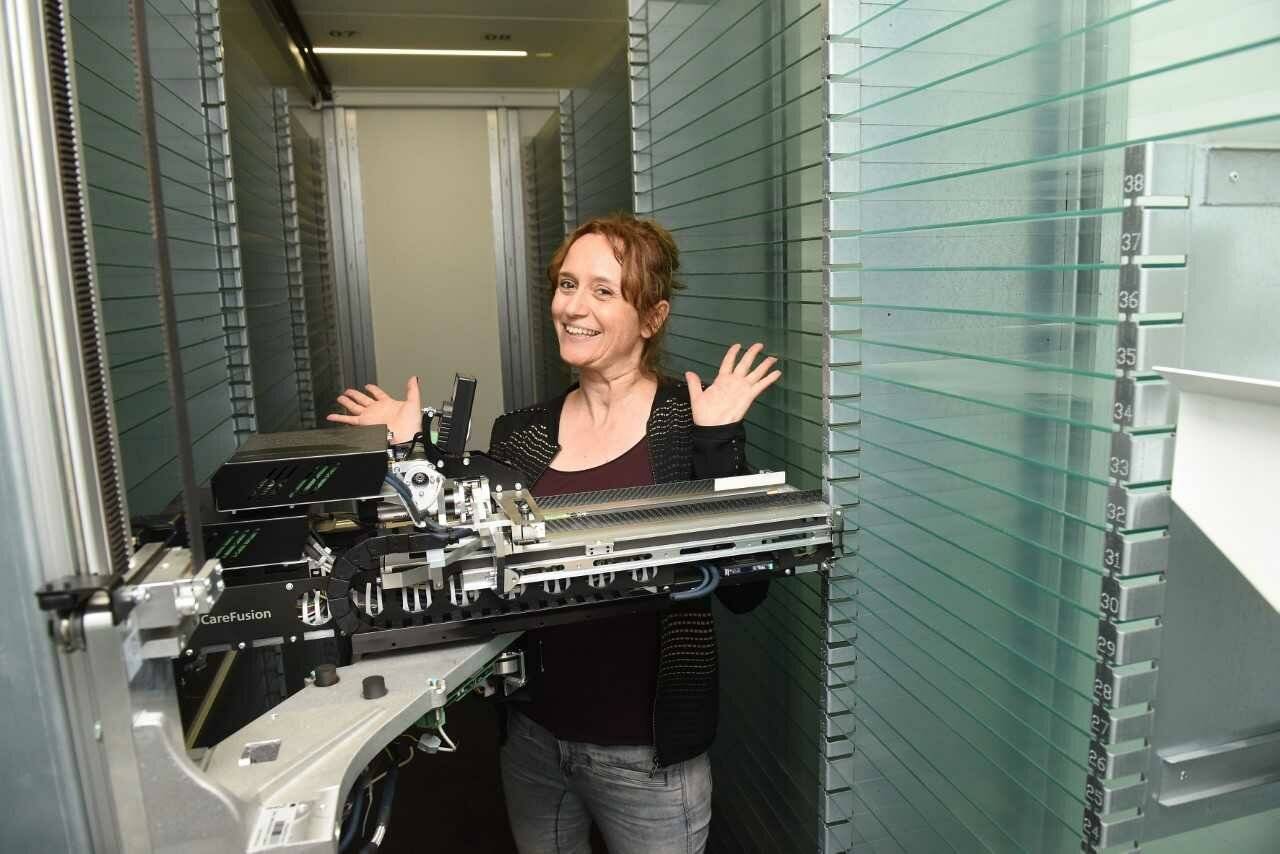Pharmacy destroyed in Ahrweiler Ahrtor pharmacy moves into GA regional news bureau
Bad Neuenahr-Ahrweiler · Pharmacist Linda Wnendt is moving her Ahrtor pharmacy to a regional bureau of the General-Anzeiger in Ahrweiler. Her pharmacy was destroyed in the flooding, but is expected to open at the end of the week in its new location at the GA bureau.
Only one desk will be used by General-Anzeiger staff in the coming weeks in the GA bureau at Bossardstraße 1 in Ahrweiler. Space is being made available: Linda Wnendt and her Ahrtor pharmacy are in the process of moving in there.
In the intermediate term, the regional newsroom will be used as a replacement for the Ahrtor pharmacy. Wnendt's life partner Shary Reeves, who is a moderator, journalist and former member of the U16 national soccer squad, is also on board to help with the move.
She has other things on her mind at the moment than her soon-to-be job as a field reporter for the UEFA Champions League. In the midst of open cardboard boxes, used scrapers and paint-soaked 10-liter buckets that dominate the scene of the news bureau, she recounts the night of the flood disaster. "We are very lucky to live in Cologne. I'll never forget the text message from the landlord that night: 'The whole pharmacy has floated away. There's nothing left to save’.'"
After a few days, the landlord then offered Wnendt the former ticket sales office in the front area of the GA bureau. An inspection by a building surveyor quickly clarified that a return of the pharmacy to the building at the Ahrtor was out of the question for the time being: the floodwaters had climbed almost to the ceiling. Plaster and screed would have to be renewed. The rooms were contaminated with mud from fecal matter. The furnishings were completely destroyed. It will likely not be possible to use the building for six months at the earliest, perhaps not even for another nine months.
Linda Wnendt asked if it would be possible to expand to other rooms in the GA bureau and she got the "okay", which she said was “a gift.” Workmen are now setting up the automated stockroom. The fact that a pharmacy can simply move into a "normal" building is not a given, she says. Authorities in Rhineland-Palatinate have precise specifications: Medicines must be stored at an ideal temperature and be kept safe from burglars. That’s why a safe and a special refrigerator are being delivered to the bureau in the coming days. Also important is that restrooms must ensure the hygiene of the employees and that there is a certain amount of space for customer consultation, et cetera. The pharmacist's operating license is dependent on the space being approved by the appropriate authorities.
Wnendt assumed that she would receive an emergency operating permit in light of such a special situation. A laboratory does not always have to be available to mix a prescription; much more important is that patients continue to receive their medications. Still, the state bureau initially refused to grant the permit, with the reason being that 110 square meters were needed for adequate storage space. But Wendt does not need this much space because of her fully automated system.
The authorities responsible assumed that the supply of medicines in the region was secure. But that is not the case. "I don't even blame the authorities for that. But they misjudged the situation," Wnendt says. She would have liked the Koblenz-based authorities to talk to her about a special solution with an alternative pharmacy concept. Instead, various small pharmacies were being set up, for example in school gymnasiums. There, medicines were sometimes not being distributed by certified pharmacists.
Many pharmacies, especially in Bad Neuenahr-Ahrweiler, are no longer in operation due to the flood disaster. Some have created emergency solutions in containers, sometimes without permission, Wnendt suspects. Because there is no other way. Because doctors and patients need their medicines. Wnendt's pharmacy is currently supplying some medicines and referring customers to functioning pharmacies. The district administration continuously publishes a list of the available emergency pharmacies and doctors.
Wnendt says she has contact through several channels with the chairman of the health committee of the Bundestag, which she plans to use if the bureaucratic jungle blocks the operation of her makeshift pharmacy. Wnendt does not yet have official permission from the responsible authorities. But doctors and patients urgently need a stable supply of medication. Wnendt: "I’m just going to do it."
Orig. text: Simun Sustic
Translation: ck




